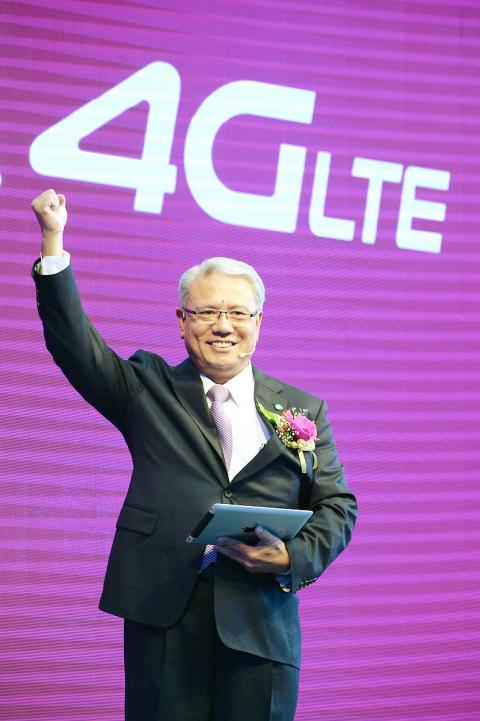Ting Hsin International Group (頂新國際集團) chairman Wei Ying-chiao (魏應交) yesterday quit as head of the group’s 4G telecom Taiwan Star Cellular Corp (台灣之星) in the latest management shakeup of the food conglomerate's non-core businesses.
Following Wei’s resignation, Taiwan Star’s board of directors approved a plan to install former China Airlines Ltd (中華航空) chairman Ringo Chao (趙國帥) as the telecom’s new chairman, the firm said in a statement.
Chao also serves as a director of Taipei Financial Center Corp (TFCC, 台北金融大樓), which operates Taipei 101.

Photo: CNA
On Wednesday, Wei also stepped down as chairman of TFCC. Ting Hsin still owns a 37.17 percent stake in TFCC.
The Taiwan Star board did not discuss the much-anticipated sale of the company.
“It is the group’s policy to enhance corporate governance and to introduce professional managers to run its subsidiaries,” Ting Hsin said in a company statement.
Wei completed his task of founding Taiwan Star and launching affordable 4G services in the nation’s highly competitive market, the statement said.
Far EasTone Telecommunications Co (遠傳電信), the nation’s second-largest telecom, is considered a frontrunner to acquire Taiwan Star in a deal reportedly worth NT$18 billion.
Far EasTone chairman Douglas Hsu (徐旭東) has said that price and public opinion on the takeover would be two deciding factors as to whether the company acquires Taiwan Star.
The acquisition, if completed, would be the biggest 4G tie-up in the nation and change the telecommunications industry’s landscape, as Far EasTone would increase its number of subscribers to 8.99 million.
Taiwan Star has about 1.6 million subscribers, including 3G users at its subsidiary, Vibo Telecom Inc (威寶電信).
Ting Hsin is under pressure to sell its local assets — even its telecom — after a series of food safety scares last year triggered a nationwide boycott of the conglomerate’s products.

In Italy’s storied gold-making hubs, jewelers are reworking their designs to trim gold content as they race to blunt the effect of record prices and appeal to shoppers watching their budgets. Gold prices hit a record high on Thursday, surging near US$5,600 an ounce, more than double a year ago as geopolitical concerns and jitters over trade pushed investors toward the safe-haven asset. The rally is putting undue pressure on small artisans as they face mounting demands from customers, including international brands, to produce cheaper items, from signature pieces to wedding rings, according to interviews with four independent jewelers in Italy’s main

Japanese Prime Minister Sanae Takaichi has talked up the benefits of a weaker yen in a campaign speech, adopting a tone at odds with her finance ministry, which has refused to rule out any options to counter excessive foreign exchange volatility. Takaichi later softened her stance, saying she did not have a preference for the yen’s direction. “People say the weak yen is bad right now, but for export industries, it’s a major opportunity,” Takaichi said on Saturday at a rally for Liberal Democratic Party candidate Daishiro Yamagiwa in Kanagawa Prefecture ahead of a snap election on Sunday. “Whether it’s selling food or

CONCERNS: Tech companies investing in AI businesses that purchase their products have raised questions among investors that they are artificially propping up demand Nvidia Corp chief executive officer Jensen Huang (黃仁勳) on Saturday said that the company would be participating in OpenAI’s latest funding round, describing it as potentially “the largest investment we’ve ever made.” “We will invest a great deal of money,” Huang told reporters while visiting Taipei. “I believe in OpenAI. The work that they do is incredible. They’re one of the most consequential companies of our time.” Huang did not say exactly how much Nvidia might contribute, but described the investment as “huge.” “Let Sam announce how much he’s going to raise — it’s for him to decide,” Huang said, referring to OpenAI

The global server market is expected to grow 12.8 percent annually this year, with artificial intelligence (AI) servers projected to account for 16.5 percent, driven by continued investment in AI infrastructure by major cloud service providers (CSPs), market researcher TrendForce Corp (集邦科技) said yesterday. Global AI server shipments this year are expected to increase 28 percent year-on-year to more than 2.7 million units, driven by sustained demand from CSPs and government sovereign cloud projects, TrendForce analyst Frank Kung (龔明德) told the Taipei Times. Demand for GPU-based AI servers, including Nvidia Corp’s GB and Vera Rubin rack systems, is expected to remain high,